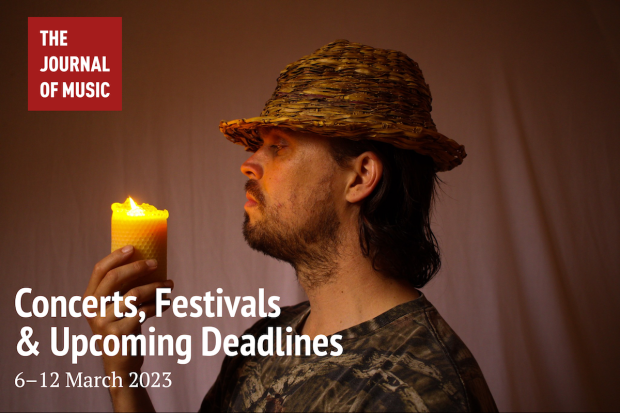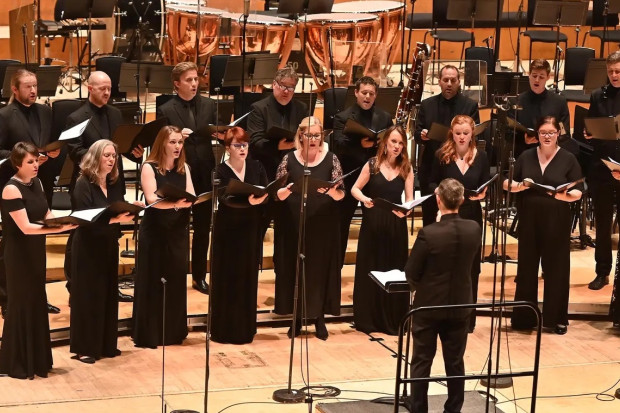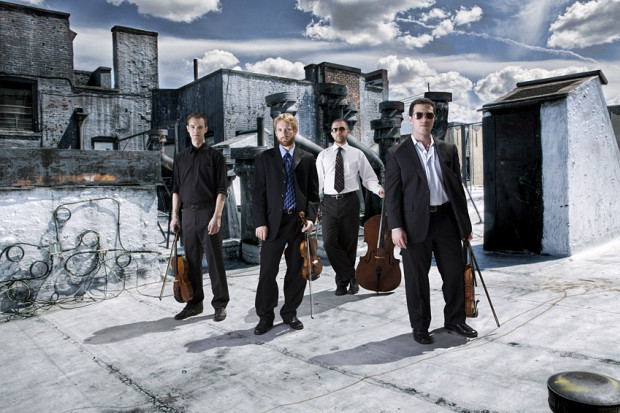
A Vicious Boredom
Musicians need to think carefully about the impact of technology on their music, writes Peter Rosser: they must resist when technology threatens to dehumanise music, to deprive it of its most essential features.
As those who deal bravely and nakedly with time (‘that double-headed monster of damnation and salvation,’ as Samuel Beckett once put it), composers and musicians, it seems, will have to journey further into the unknown than other creative artists during this century. And this is to say: with time as lived — not epic time, not historical time, not the moments, sensations, the unconscious reservoirs of timelessness that poets, painters and writers attempt to reveal. No, this is time untempered, from a to b, or from a to z, the ten minutes of a composition, the ninety minutes of an evening concert — the terrifying clock time, in other words, to which we’re all inextricably bound.
Even filmmakers live outside of real time. Their constructs are paraphrases, highly edited suggestions, or trailers, of what lived-time could be like — if we were all having more fun. The composer of music on the other hand, and however expertly she may handle types of narratives of utopia or dystopia, elisions or erasures of consciousness, still has to coax the listener through a part of a day with nothing more interesting than a handful of meaningless sounds.
But why will time become such an issue in the twenty-first century? Many reasons, but chiefly this: time is more fought-over, more prized, than ever before. It has, of course, always been subject to commodification; but the rich have become increasingly adept at hoarding it at the expense of the poor and the luckless, who will always run out of it. The western individual, in fact, has an embarrass de richesses when it comes to time, so much so that as retirement becomes a near counterweight to working life, the state has been persuaded to renege on its promises for provision in older age and hand over the management of increased longevity to the (always happy to oblige) private sector. As physical resources dwindle, and as our economic system continues its inexorable pursuit of growth, the pinch has to be repositioned and reapplied — and profiteering will have to move itself more completely into the fourth dimension. And this marketisation will result in predictable paradoxes; time, commodified and fetishised like never before, will be subject to many competing demands — we’ve never had so much of it, but we’ll not be able to spare a moment of it, such is the density of our lives. In this climate, the musician’s pitch, which necessarily asks the busiest of people for an exchange of money for ‘time well spent’, will be increasingly difficult to push.
The promise of advancement
With this new preciousness of time, there comes the inevitable appearance of the enemy: the time-hungry antagonist named boredom, the deadly foe that fills the vacuum left in the wake of time stolen. And so, boredom has become a major cultural topic of our day. This is not surprising since the always-pushing-forward, never completed automation of society condemns us all now to deal more frequently with interfaces — systems, bureaucracies, media, machines — than with real people. What will happen to the human being in these conditions? And how does it cope? Writers and novelists know this issue well. David Foster Wallace’s unfinished and posthumously published novel The Pale King chooses the working lives of the US Internal Revenue Service as its subject: ‘Enduring tedium over real time in a confined space is what real courage is,’ writes the author, clinging to the hope that courage, indeed, is still possible. But this narrative, which is about the ‘bureaucratisation of everything’, will scupper itself, inevitably, on the realisation that courage is the human quality that is precisely not needed by the system anymore — only acquiescence and acceptance are celebrated. (Neil Strauss writes well about the new pressures of conformity on the internet generation in his recent Wall Street Journal piece ‘The Insidious Evils of the “Like” Culture’).Heroism in the modern world, concludes Foster Wallace, is dead. JG Ballard covered similar ground in his 2003 novel Millennium People where a turbo-charged economy had ‘forgotten’ that it had any responsibility to the sustenance of careers, families or communities. The result — a typically devastating and macabre Ballardian conceit — is the emergence of a renegade group of desperate middle class terrorists (general practitioners, teachers, etc.), who feel that they’re in a last ditch attempt to avert oblivion in the face of a consumerist orgy that they themselves inaugurated: ‘A vicious boredom ruled the world for the first time in human history, interrupted by meaningless acts of violence.’ The pathos of Ballard’s writing comes from the all-pervasive feeling, in the protagonists, the writer and the reader, of having been let down by a technologised society that had promised so much in the way of advancement — of material, and indeed moral, progress.
In Ballard’s world — which is, of course, our world, fictionalised for the purposes of analysis — violent or erotic sensation is the only thing left to cling to. And when even this is to become outlawed by the increasingly puritanical guardians of culture, the film executives and the TV producers, what is left for us to do? In his recent essay ‘Terror and Boredom: The Dependent Mind’, Martin Amis lays out a terrifying near future, namely the full realisation of a new Age of Boredom. For Amis, the modern world of fear and security is not just boring in the sense that airport security is boring (his six-year-old daughter’s fluffy duck being subjected to a thorough body search at Montevideo airport, for example), but boring in the sense that ‘the global confrontation with the dependent mind’ is boring — black, suffocating, soul-deadening. Amis is talking about millenarian problems; of the impossibility of living with fundamentalist religion, ideology and death-cultism, of a world in which certainty, absolutism, truth-revelation, progressivism, concretism — all the hard and fast sureties of the unimaginative mind — have been seen to usurp the qualities that artists must uphold at all costs: ambiguity, faith, nuance, belief, humour and, above all, irony.
In many ways, though, writers have it easy. They work in a tradition that hasn’t changed so much over the ages, and one, in fact, that cannot conceivably change in the future, despite the fresh ways of disseminating its product. What writers deal with, simply, is thoughts on paper; and how beautifully pure is that? This is not, of course, the author’s own thoughts, or at least not only the author’s own thoughts; on the page we find multiple, diverse, partial or unformulated thoughts, with all their relative wrongnesses and perhapsnesses, in conference and refracted through the morally pregnable prism of style. JG Ballard, David Foster Wallace and Martin Amis are just three figures from a resistance movement whose combatants choose to enter the ‘theatre’ (to reclaim a term now too often ceded to the military) armed only with a ballpoint pen. Musicians, however, are different; or at least, have become different. They will, and should, reflect this new technologised, turbo-capitalist world — they can hardly live in a different world — but, working with the given does not mean that blind acceptance is the only way to proceed.
In neutral spaces
There is a growing division in music practice, especially in academia. Composers, performers and theorists were once seen as integral parts of the same discipline. Now, with ever increasing specialisation, they have their own agendas. Music now exists across traditional dividing lines, as an arts and a science degree, and often in separate buildings, with the practice rooms and libraries far removed from the sound laboratory. Composers have undergone the most radical transformation of all as they deal with new technologies, and new ideas about communication theory. Increasingly, the sounds they produce come from a computer, not an instrumentalist, and this has given birth to a new discipline more easily understood by the engineer than the artist. Composers have also felt the need to rename themselves and rebrand their activities. They’ve become sonic artists, and their discipline is acousmatics — put simply, the creation and manipulation of sounds through the development of computer and network systems, and its reception in purpose-built, darkened, and acoustically neutral spaces.
In reality, sonic arts practitioners have severed their links with the more traditional concerns of the old music departments, and they’ve taken much of the money with them. The reasons are obvious: tangible ‘hard-scientific research’, however pseudoscientific in practice, is so much more attractive to the music professor seeking not just raw cash but a viable raison d’être in an ever more utilitarian, and anti-aesthetic world. Pen and paper creativity is now regarded with suspicion. In the age of austerity (and austerity, the move from public to private funding of services, has been the mode for many more years than is readily acknowledged) individuals cannot afford personal expression. The result of this is easily observed within the sonic laboratories of the world’s university music departments. Music continues unceasingly along the road of computerisation and systemisation.
And a strange thing is happening: composers are closing their eyes. The new breed of acousmatic composers, or sonic artists, who have to a large extent taken over the creative research output of the university music departments, are so vampirically light-sensitive that they demand darkness before their sounds can be given to the world..
Acousmatic, remember, comes from the Greek akousmatikoi: Pythagoris’ immature, dutifully dumb and blind students who were not trusted to say anything until a five year vow of silence had passed. They were newbies so condescended to that they were forced to listen to lectures through a veil, all the better to concentrate on the genius of the sounds reaching them from the master. Dialogue was forbidden. And acousmatics styles itself around this. As a working definition we can therefore offer the following: acousmatics is the (quasi-)spiritual appreciation of sounds for their own sake, without idea of, or care for, origin, meaning, or context. In other words, discussion without an interlocutor (non-discussion), ideas without context (abstraction), language without communicating equals (propaganda? ideology? non-language, in any case).
And what happens to music if we close our eyes? A visit to any of the world’s sonic labs will uncover the experience of this newly-vanished type of music. It is, on the whole, uniform, unceasing, computer-generated, spatial and non-narrative. This is music that doesn’t begin, it sets off, it doesn’t progress, it continues, and it doesn’t end, it stops (or is stopped) in its tracks. The music emanates from, and is created by computer programmes, and in the process it doesn’t go through the stage where symbols interact, where detail is paramount and where content is always more important than form. It very rarely, in fact, has the whiff of a composer, of a practiced hand, about it at all. And if the music has never existed as a grubby, worked-over, palimpsested text, then is it ever going to be able to function as a language? And no, a computer language — by definition encoded, hidden, secretive, functioning purely to produce results that are beyond the capacity of the human mind — will not do. There is no feeling in ones and zeros — how could there be? — computer language is a nonhuman language, created by humans, yes, but not designed to be received by humans. In this music there is only insistence; there are no barlines, and therefore no gestures, and therefore no breathing space; there is no grammar, and therefore no dialogue, and therefore no meaning — a kind of amniotic fluid in which the listener is not given room to react, only to accept.
This essay is not a call to close down sonic laboratories, and, of course, computer-generated music is not to be dismissed out of hand. Like all disciplines it will have its peaks and troughs, its moments of genius and madness and its moments of miserable compliance. But a warning shot is needed when an activity voluntarily excuses itself so completely from the public domain, as seems to be happening with acousmatics; when its connection to the outside world is more likely to be evaluated, not by its musical results, but by the depth of its industry connections, and by how far it can improve the commercial opportunities of gaming, networking and computer design. At acousmatic or computer music events, there will not be one visitor from outside of academia, a fact that tends to be taken as a positive sign by the practitioners who see themselves (with their powerful computers and secretive programming; their acoustically neutral and sealed laboratories; and their networked affiliations with major international hubs of research excellence) as existing on the blindingly hot tip of scientific advancement.
Everything is decided
But for all the power and expense of the equipment and the buildings in our sonic laboratories, the musical results tend to be strangely dead. Most of these concerts are reminiscent of the airport waiting lounge, where the traveller has to undergo a process of de-personification to get through this unreal world: a security controlled, air-conditioned, quality assured, sterile and, above all, preternaturally safe environment in which all decisions are taken care of — all decisions. There is a kind of violence inherent in this situation that comes straight off the pages of JG Ballard. In the face of technology you have to acquiesce, you have to follow directions… or you’ll go mad. There is usually no way of predicting, or knowing, or feeling, how long a piece of music is going to last, except by placing trust in the figures by the console, with their fingers on the on/off button.
Perhaps it was inevitable that the idea of creativity would be vanquished in the postmodernists’ constructed world, where the medium itself is the only message. The artist is relieved of the burden of narrative, or myth, or reference, because these concepts are now void. And in the empty space opened up by the disappeared composer, comes the sonic artist, who is the mediator, the administrator, the bureaucrat. These are the figures who survive precisely because they’ve successfully negotiated the contract that requires de-personification. They may affect humility in the face of the machine (and this is why they are unable to bow to audiences like musicians used to, for example), but they intimate, with their shadowy presence at the console that they are in control.
Inventing a monster
Then there is network music; the next frontier… music created and performed over the internet, and a prime culprit in this new advancement of boredom. Firstly, it must be said, network music has nothing new, nothing even remotely prescient about it — we’ve had video link interviews with those annoying little delays on TV for as long as anyone can remember. Network music, when one experiences it ‘live’ in a sonic lab or on the net, feels as dated as viewing playbacks of Peter Snow covering American elections on the BBC’s Newsnight in the 1980s. Nowadays, though, we have to endure more technical glitches. The main thrust of network research is the problem of tackling these little delays, now known as the problem of latency, during shared performances across interconnected computers. And this problem is an attractive one, of course, because it is a window of opportunity for the fund-seeking academic. Latency can never, by definition, be entirely eradicated — and in academia, if you’re seeking career-long justification and sustenance, there’s no better cause than a lost cause.
Predictably, the music now being produced within ‘near-eradicated latency’, is as basic as music can be. And ironically, it’s the type of music that was always played over distances, long before any type of modern communications existed. The music is simply call-and-response over a drone, with all of the worrying and bellicose associations this has if you think about the reasons people needed to communicate over large distances in the past. It was always about the warning of imminent danger, or a terrifying promise of the same. And so the networkers miss the same point as the acousmatics. Music isn’t about responding, however immediately, to your interlocutor — it’s about predicting what is about to happen. Again, it’s all in the eyes, and witnessing a musician attempting to improvise with someone in another room, or on another continent, is as sad as rereading the tragic miscommunications between Echo and Narcissus.
Strangely, this type of activity has somehow enhanced its reputation by associating itself with green politics. Musicians can rehearse without travelling. Audiences can enjoy the pleasures of concert-going without leaving their homes. In one recent article in Contemporary Music Review the writer equates the potential benefits of the eco-friendly networked performance with the way television itself became the most powerful champion of fuel efficiency! (Yes, those seven hundred million capacity football stadiums were real fuel-thirsty monstrosities, and what would have happened at major world events without the invention of TV? The Berlin Wall comes down, over a billion spectators, imagine the amount of portaloos alone!) This is a common technique of the fraudulent: create an imagined monster in whose reflected light you become the epitome of virtue. The monster here, of course is a truly democratised, popular and local concert-going. How common….
In his recent BBC documentary series All Watched Over by Machines of Loving Grace, Adam Curtis argues that we have been seduced into believing a number of myths that makes our surrender to the new transnational, commercially driven, computerised world more palatable. These myths apply themselves to thinking about ecology, sociology, economics, politics, and indeed the arts. But one central tenet drives them all — the idea of self-regulating systems. In a post-ideological world, the thinking goes, the need for collective action and for political strategies designed to free humans from the tyrannies of war and destitution, have been superseded by the sudden understanding of how computer networking, as a philosophy and as a practice, can manage the difficult multiple relationships between people, society and environment. Within this way of thinking, the environment is a finely tuned mechanism that naturally finds its own state of equilibrium through the complex web of its countless micro-relationships. Likewise the global market, left sufficiently alone by politicians, will develop into a wholly positive organism devoted to the creation of growth and stability for all. And in society, the liberation of peoples and individuals will be made possible by computer networking, by enabling individuals to determine their own communications outside of traditional mediation and political parties. The power of this new ‘ideology of the machine’, Curtis argues, is plain to see; because we persist in believing it, despite the collapse of the markets, the continued exhaustion of the environment, and the obvious truth that ‘Facebook revolutions’ (remember Iran, 2009) are only superficial expressions.
Music without resistance
The modern world we have blindly walked into is best described by a sinister transformation of three (already sinister) sci-fi words: resistance is futile becomes resistance is undesirable. Trust the machines, they will ease our passage to the promised land. And we see this so clearly in music today with the conscious undertaking to eliminate resistance. In this acousmatic vision, now fully realised in music departments around the world, the composer can express ideas without the resistance of a performer or a score; the purity of sound can make its way to the listener in an acoustically neutral environment, without the resistance of natural acoustics; music can be performed synchronously from different positions across the globe without the resistance of distance. Most worryingly, as the free-play of purely sonic phenomena, this music can be enjoyed without the resistance of extra-musical thought.
But resistance should not be eradicated; it is, after all, the mainspring of music. As composers, performers and listeners, we use music to resist the banality of empty time, and to resist the banality of empty thought. At its most radical, music resists the platitudes of everyday language by creating an alternative type of communication, one that intentionally makes itself unavailable to easy or simplistic solutions.
In music, resistance is also a compositional tool. What is syncopation, to take one simple example, but the imagined retardation of the easy flow of pulse? And an imaginative pull is more than enough. That frictional landing bay, small as it is, becomes a space, a platform, where the body, as much in contemplation as in dance, can manoeuvre, freely and erotically.
Music is lost if it cedes its primary function of manipulating and questioning the perception of time. Geometries and spatialisations, codifications by texture and timbre, are all valuable parts of the discipline of music-making, but they’re not its motivating energy. What’s been lost, perhaps, in the world of contemporary music is a willingness on the part of musicians, composers and listeners alike to carry on the activity of engaging with a vision of time that’s human, malleable, philosophical and dialectical. Bureaucracy is a conservative force because it steals away human time and replaces it with dead time. Nonhuman mechanisms are bound to do this. Samuel Beckett said of Proust in 1931, ‘He accepts regretfully the sacred ruler and compass of literary geometry. But he will refuse to measure the length and weight of a man in terms of his body instead of in terms of his years.’ Musicians are perfectly positioned to underwrite this within their own time-rich discipline.
The composer Brian Ferneyhough, in a conversation with travelling students recorded informally and disseminated via, yes, the internet, laid out why he believes so many people engage with music in the first place. Ferneyhough may not be a natural leader for many in the music world, but these words are worth considering, even if only to prompt the disarmingly simple questions: why do composers compose, and why do we listen?
Music is a form of life…. A piece of music cannot be de-invited. The work of art is not there just to register, to entertain, but also to continually take apart and reassemble the molecules of meaning which, for us, constitute reality. We cannot, we dare not, take them for granted. We must continually deconstruct them and reconstruct them in other formations to see what their mode of reality, for a moment, might be. If we did not have that, we would all be hopeless prisoners of the banal void which the advertising industry, politics, the world of entertainment in general, wishes to stifle us with. How do we produce that authenticity, that directness, that shocking credibility, that sharpness, that blindingness of image, whatever those values are? The work of art is the final mode of resistance to this takeover by corporate awareness. It is our last hope.
Published on 26 July 2011
Peter Rosser (1970–2014) was a composer, writer and music lecturer. He was born in London and moved to Belfast in 1990, where he studied composition at the University of Ulster and was awarded a DPhil in 1997. His music has been performed at the Spitalfields Festival in London, the Belfast Festival at Queen’s and by the Crash Ensemble in Dublin. In 2011 the Arts Council acknowledged his contribution to the arts in Northern Ireland through a Major Individual Artist Award. He used this award to write his Second String Quartet, which was premiered in 2012 by the JACK Quartet at the opening concert at Belfast's new Metropolitan Arts Centre (The MAC). Peter Rosser also wrote extensively on a wide range of music genres, with essays published in The Journal of Music, The Wire, Perspectives of New Music and the Crescent Journal. He died following an illness on 24 November 2014, aged 44.

















